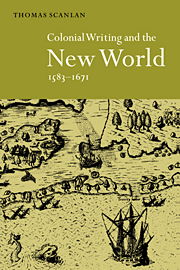Book contents
- Frontmatter
- Contents
- List of illustrations
- Acknowledgments
- Introduction
- 1 The allegorical structure of colonial desire
- 2 Fear and love: two versions of Protestant ambivalence
- 3 Forgoing the nation: the Irish problem
- 4 Preaching the nation: the sermon as promotion
- 5 Love and shame: Roger Williams and A Key into the Language of America
- 6 Fear and self-loathing: John Eliot's Indian Dialogues
- Coda
- Notes
- Index
2 - Fear and love: two versions of Protestant ambivalence
Published online by Cambridge University Press: 04 December 2009
- Frontmatter
- Contents
- List of illustrations
- Acknowledgments
- Introduction
- 1 The allegorical structure of colonial desire
- 2 Fear and love: two versions of Protestant ambivalence
- 3 Forgoing the nation: the Irish problem
- 4 Preaching the nation: the sermon as promotion
- 5 Love and shame: Roger Williams and A Key into the Language of America
- 6 Fear and self-loathing: John Eliot's Indian Dialogues
- Coda
- Notes
- Index
Summary
One of the most dramatic realizations of the allegorical potential of colonial adventure was Theodor DeBry's Great Voyages. Described by one recent critic as “perhaps the most massive and magnificent illustrated travel collection of all time,” DeBry's Great Voyages assembled a wide range of texts and images in thirteen volumes published over forty-five years. This impressive undertaking, which DeBry began in 1590 by publishing Thomas Harriot's Briefe and True Reporte along with engravings based on the watercolors by John White, was continued by DeBry's sons Jean Théodor and Jean Israel, after the death of their father in 1598. Although the colonial enterprise operated in the margins of the known geographical world, DeBry understood that it could be rendered central to Europe's struggle between Protestants and Catholics. DeBry, I would suggest, offered Europeans the most forceful articulation of the notion that Protestant identity could achieve its fullest expression through colonialism. It will be my argument in this chapter that the texts and images that constituted the Great Voyages functioned as components in a compelling allegory of the ongoing Protestant struggle for survival in a predominantly (and menacingly) Catholic Europe. This assertion will in turn form part of the larger argument of this book, namely that through their colonial involvement in the New World the English discovered a means of connecting their religious identity with their emerging sense of national identity – a process that would consistently find its most succesful articulation in representations of English relations with native populations.
Born in 1527 or 10528 in Liege, DeBry was exiled from his home in 1570 after being accused by the Catholic authorities of sympathizing with the Reformation.
- Type
- Chapter
- Information
- Colonial Writing and the New World, 1583–1671Allegories of Desire, pp. 38 - 67Publisher: Cambridge University PressPrint publication year: 1999



